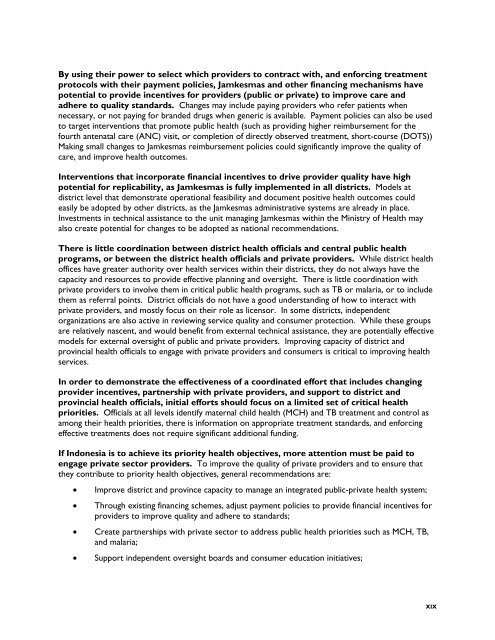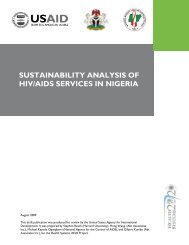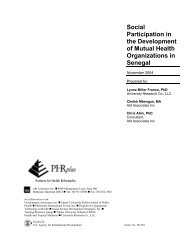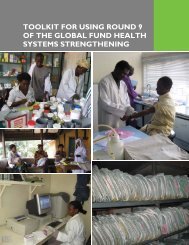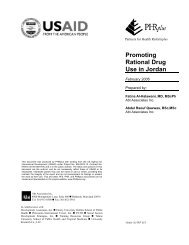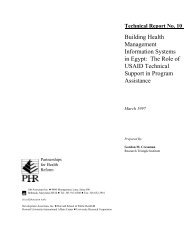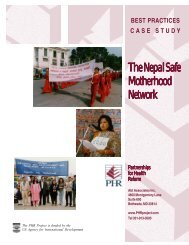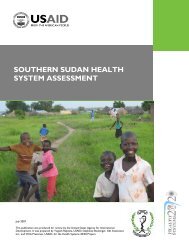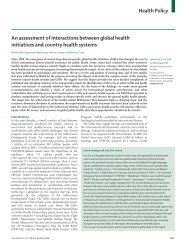More than 40 percent of all women and 60 percent of women in urban areas rely on private sectorproviders for family planning services.Many of Indonesia’s health indicators are improving; however, other indicators remain aconcern. Three indicators remain a cause for concern: i) high child mortality; ii) high maternalmortality rates (MMR); and iii) child malnutrition rates. Despite increases in the number of deliveriesattended by a health professional (from 66 percent in 2002-03 to 73 percent in 2007) and the number ofdeliveries taking place in a health facility (40 percent to 46 percent) (IDHS, 2008), the MMR remainshigh. Only 9.7 percent of deliveries take place in public facilities – all other deliveries are in privatefacilities, or at home assisted by a private midwife or traditional birth attendant (TBA). It is unlikely thatmaternal mortality objectives can be met without fully engaging the private sector.Indonesia ranks third on the list of 22 high-burden tuberculosis (TB) countries in the world.TB is responsible for 6.3 percent of the total disease burden in Indonesia, compared with 3.2 percent inthe Southeast Asian region. After achieving a case detection rate of 73 percent in 2006, Indonesiaslipped out of the target zone in 2007, more recently reporting case detection of 68 percent. Theperformance decline is in part attributed to the temporary cessation of support from the Global Fundfor AIDS, Tuberculosis and Malaria (GFATM) for nine months, resulting from GFATM audits andassessments that identified “weaknesses…in managing a conflict of interest between the PrincipalRecipient and one of its SRs [sub-recipients].” 2 This situation also highlighted weak oversight by theCountry Coordination Mechanism (CCM) over the Principal Recipient (PR) and weak programmaticfinancial and management capacities of the PR. Although the conflict was resolved, and disbursementsresumed, activity was extremely low throughout 2007.In the current environment, there is significant scope to work with private providers toimprove access to health services and quality of health services. Many private providers havenot traditionally been partners in public health programs, but represent important channels for reachinglarge numbers of consumers. Two groups that are seldom even considered health providers arepharmacists and drugsellers – however, they must be engaged because for half of all Indonesians whochoose to self-medicate, this is their first contact at the onset of illness. Also increasingly importantpartners are the faith-based NGOs that are new recipients of GFATM grants. These potential partnershave central-level coordinating boards, and varying degrees of organizational structure at province anddistrict level. While central-level government officials and other partners are critical to ensuringsupport and providing avenues for expansion, initial implementation should be based at district andprovince level in order to ensure operational feasibility. Working through all levels of partnerorganizations, along with engaging other organizations such as the Association of District <strong>Health</strong> Offices(Asosiasi Dinas Kesehatan/Adinkes), would maximize the likelihood of dissemination when appropriate.There have been several important changes in health financing over the last five years.Public funding for health has increased substantially, primarily from central budget, but also from districtbudgets. Much of this new funding is channeled through insurance schemes for the poor. Jamkesmas,the central government financing scheme for the poor represents 25 percent of the Ministry of <strong>Health</strong>budget and covers 76.4 million Indonesians. At least 60 districts, and as many as 100, have supplementalfinancing schemes for the poor or near-poor. Insurance payers have advantages over individuals inensuring quality and enforcing adherence to clinical standards – they can more easily access technicalknowledge regarding appropriate treatment (employ physicians to review treatment protocols) and havemore leverage over providers as they represent thousands of patients.2 http://www.theglobalfund.org/grantdocuments/5<strong>IN</strong>DT_1084_493_gpr.pdfXVIII
By using their power to select which providers to contract with, and enforcing treatmentprotocols with their payment policies, Jamkesmas and other financing mechanisms havepotential to provide incentives for providers (public or private) to improve care andadhere to quality standards. Changes may include paying providers who refer patients whennecessary, or not paying for branded drugs when generic is available. Payment policies can also be usedto target interventions that promote public health (such as providing higher reimbursement for thefourth antenatal care (ANC) visit, or completion of directly observed treatment, short-course (DOTS))Making small changes to Jamkesmas reimbursement policies could significantly improve the quality ofcare, and improve health outcomes.Interventions that incorporate financial incentives to drive provider quality have highpotential for replicability, as Jamkesmas is fully implemented in all districts. Models atdistrict level that demonstrate operational feasibility and document positive health outcomes couldeasily be adopted by other districts, as the Jamkesmas administrative systems are already in place.Investments in technical assistance to the unit managing Jamkesmas within the Ministry of <strong>Health</strong> mayalso create potential for changes to be adopted as national recommendations.There is little coordination between district health officials and central public healthprograms, or between the district health officials and private providers. While district healthoffices have greater authority over health services within their districts, they do not always have thecapacity and resources to provide effective planning and oversight. There is little coordination withprivate providers to involve them in critical public health programs, such as TB or malaria, or to includethem as referral points. District officials do not have a good understanding of how to interact withprivate providers, and mostly focus on their role as licensor. In some districts, independentorganizations are also active in reviewing service quality and consumer protection. While these groupsare relatively nascent, and would benefit from external technical assistance, they are potentially effectivemodels for external oversight of public and private providers. Improving capacity of district andprovincial health officials to engage with private providers and consumers is critical to improving healthservices.In order to demonstrate the effectiveness of a coordinated effort that includes changingprovider incentives, partnership with private providers, and support to district andprovincial health officials, initial efforts should focus on a limited set of critical healthpriorities. Officials at all levels identify maternal child health (MCH) and TB treatment and control asamong their health priorities, there is information on appropriate treatment standards, and enforcingeffective treatments does not require significant additional funding.If Indonesia is to achieve its priority health objectives, more attention must be paid toengage private sector providers. To improve the quality of private providers and to ensure thatthey contribute to priority health objectives, general recommendations are:• Improve district and province capacity to manage an integrated public-private health system;• Through existing financing schemes, adjust payment policies to provide financial incentives forproviders to improve quality and adhere to standards;• Create partnerships with private sector to address public health priorities such as MCH, TB,and malaria;• Support independent oversight boards and consumer education initiatives;XIX
- Page 1: PRIVATE SECTOR HEALTHCARE IN INDONE
- Page 5: PRIVATE SECTOR HEALTH CAREIN INDONE
- Page 8 and 9: 7. Rationalizing Use of Medications
- Page 11 and 12: ABBREVIATIONSANCAskesAskeskinAusAID
- Page 13: THEUSAIDVATWHOTotal health expendit
- Page 17: EXECUTIVE SUMMARYAs documented in I
- Page 21: higher reimbursement for complex de
- Page 25 and 26: 2. BACKGROUND2.1 GENERAL BACKGROUND
- Page 27 and 28: While decentralization of the healt
- Page 29: FIGURE 1: TOTAL EXPENDITURES ON HEA
- Page 32 and 33: poor, which only allows use of publ
- Page 34 and 35: Lack of overall investment in healt
- Page 36 and 37: • Pharmacists and drugsellers - A
- Page 38 and 39: 4.2 ASSESSMENT APPROACHData collect
- Page 40 and 41: practice, however, limited resource
- Page 42 and 43: Dinas to the hospital detailing the
- Page 44 and 45: Unlike Muhammadiyah and NU faciliti
- Page 46 and 47: TABLE 3: POPULATION COVERAGE BY HEA
- Page 48 and 49: customary fees. At the same time, i
- Page 51 and 52: 7. RATIONALIZING USE OFMEDICATIONS7
- Page 53 and 54: too few medicines to meet the publi
- Page 55 and 56: 8. PHARMACISTS ANDDRUGSELLERS AS PA
- Page 57 and 58: district provides TB drugs to priva
- Page 59 and 60: 9. ROLE OF PROFESSIONALASSOCIATIONS
- Page 61 and 62: IMA is involved in any allegations
- Page 63 and 64: 10. CONCLUSIONS ANDRECOMMENDATIONSI
- Page 65: If Indonesia is to achieve its prio
- Page 68 and 69:
• Supporting the mapping of all f
- Page 71 and 72:
ANNEX A: ASSESSMENT GUIDEIndonesia
- Page 73 and 74:
Key Informants at Provincial LevelK
- Page 75:
Key InformantsoooIBI, and memberrep
- Page 78 and 79:
Assessment Question Approach/Backgr
- Page 80 and 81:
Indicator Number Data Source and No
- Page 82 and 83:
1.3.4 DinKes Experience with Privat
- Page 84 and 85:
The team interviewed a manager 16 a
- Page 86 and 87:
They have used many different healt
- Page 88 and 89:
In Yogyakarta Province, there are 1
- Page 90 and 91:
graduates to work immediately in 24
- Page 92 and 93:
Muhammadiyah is a 226 bed hospital
- Page 94 and 95:
Dinas Yogyakarta31. Mardiningsih, S
- Page 96 and 97:
2.1 Provincial InformationThe popul
- Page 98 and 99:
How can services provided at privat
- Page 100 and 101:
The Provincial Health Office meets
- Page 102 and 103:
from multiple sources: 40 percent f
- Page 104 and 105:
2.9 Licensing and Oversight of Phar
- Page 106 and 107:
As per IMA Propinsi, they meet with
- Page 108 and 109:
It was mentioned that the budget fo
- Page 110 and 111:
• Private midwives are willing to
- Page 112 and 113:
etween PKBI and the District Health
- Page 114 and 115:
Cahya Kawaluyan Hospital has adapte
- Page 116 and 117:
the midwife to charge a slightly hi
- Page 118 and 119:
Involving Physicians in DOTS. A sig
- Page 120 and 121:
Ikatan Bidan Indonesia (IBI) West J
- Page 122 and 123:
Indicator DKI West Jakarta Data Sou
- Page 124 and 125:
visited an average of over 60 perce
- Page 126 and 127:
3.9 Potential role of professional
- Page 128 and 129:
members who pay membership fees. Th
- Page 130 and 131:
emainder paying out of pocket. Reve
- Page 132 and 133:
3.20 Indonesian Pharmacists Associa
- Page 134 and 135:
OtherApotek Gitamara, Jl. Kemanggis
- Page 136 and 137:
13. Government of Indonesia, World
- Page 138:
41. Thrabany, Hasbullah, et al. 200


